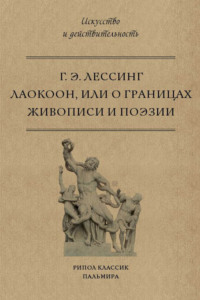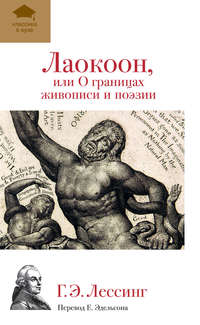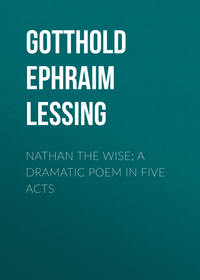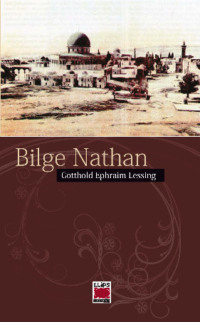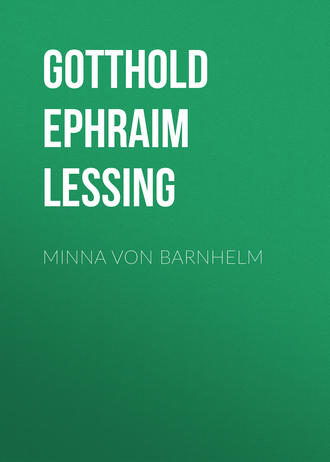
Minna Von Barnhelm
MIN.
Pray go quickly. I will set all that right again.
(Exit the Landlord.)
Franziska, run after him, and tell him not to mention my name!
(Exit Franziska.)
SCENE VII
Minna, and afterwards Franziska
MIN.
I have found him again!—Am I alone?—I will not be alone to no purpose.—
(Clasping her hands.)
Yet I am not alone!
(Looking upwards.)
One single grateful thought towards heaven, is the most perfect prayer! I have found him! I have found him!
(With outstretched arms.)
I am joyful and happy! What can please the Creator more than a joyful creature!
(Franziska returns.)
Have you returned, Franziska? You pity him! I do not pity him.
Misfortune too is useful. Perhaps heaven deprived him of everything— to give him all again, through me!
FRAN.
He may be here at any moment.—You are still in your morning dress, my lady. Ought you not to dress yourself quickly?
MIN.
Not at all. He will now see me more frequently so, than dressed out.
FRAN.
Oh! you know, my lady, how you look best.
MIN. (after a pause).
Truly, girl, you have hit it again.
FRAN.
I think women who are beautiful, are most so when unadorned.
MIN.
Must we then be beautiful? Perhaps it was necessary that we should think ourselves so. Enough for me, if only I am beautiful in his eyes.
Franziska, if all women feel as I now feel, we are—strange things.
Tender hearted, yet proud; virtuous, yet vain; passionate, yet innocent. I dare say you do not understand me. I do not rightly understand myself. Joy turns my head.
FRAN.
Compose yourself, my lady, I hear footsteps.
MIN.
Compose myself! What! receive him composedly?
SCENE VIII
Major von Tellheim, Landlord, Minna, and Franziska
MAJ. T. (walks in, and the moment he sees Minna rushes towards her).
Ah! my Minna!
MIN. (springing towards him).
Ah! my Tellheim!
MAJ. T. (starts suddenly, and draws back).
I beg your pardon, Fraulein von Barnhelm; but to meet you here!!!!!
MIN.
Cannot surely be so unexpected!
(Approaching him, whilst he draws back still more.)
Am I to pardon you because I am still your Minna? Heaven pardon you, that I am still Fraulein von Barnhelm!
MAJ. T.
Fraulein…
(Looks fixedly at the Landlord, and shrugs his shoulders.)
MIN. (sees the Landlord, and makes a sign to Franziska).
Sir!!!!!
MAJ. T.
If we are not both mistaken!!!!!
FRAN.
Why, Landlord, whom have you brought us here? Come, quick! let us go and look for the right man.
LAND.
Is he not the right one? Surely!
FRAN.
Surely not! Come, quick! I have not yet wished your daughter good morning.
LAND.
Oh! you are very good (still does not stir).
FRAN. (takes hold of him).
Come, and we will make the bill of fare. Let us see what we shall have.
LAND.
You shall have first of all!!!!!
FRAN.
Stop, I say, stop! If my mistress knows now what she is to have for dinner, it will be all over with her appetite. Come, we must talk that over in private.
(Drags him off.)
SCENE IX
Minna, Major von Tellheim
MIN.
Well, are we still both mistaken?
MAJ. T.
Would to heaven it were so—But there is only one Minna, and you are that one.
MIN.
What ceremony! The world might hear what we have to say to one another.
MAJ. T.
You here? What do you want here, Madam?
MIN.
Nothing now
(going to him with open arms).
I have found all that I wanted.
MAJ. T. (drawing back).
You seek a prosperous man, and one worthy of your love; and you find— a wretched one.
MIN.
Then do you love me no longer? Do you love another?
MAJ. T.
Ah! he never loved you, who could love another afterwards.
MIN.
You draw but one dagger from my breast; for if I have lost your heart, what matters whether indifference or more powerful charms than mine have robbed me of it? You love me no longer; neither do you love another? Wretched man indeed, if you love nothing!
MAJ. T.
Right; the wretched must love nothing. He merits his misfortunes, if he cannot achieve this victory over himself—if he can allow the woman he loves to take part in his misfortune… Oh! how difficult is this victory!… Since reason and necessity have commanded me to forget Minna von Barnhelm, what pains have I taken! I was just beginning to hope that my trouble would not for ever be in vain—and you appear.
MIN.
Do I understand you right? Stop, sir; let us see what we mean before we make further mistakes. Will you answer me one question?
MAJ. T.
Any one.
MIN.
But will you answer me without shift or subterfuge? With nothing but a plain "Yes," or "No?"
MAJ. T.
I will—if I can.
MIN.
You can. Well, notwithstanding the pains which you have taken to forget me, do you love me still, Tellheim?
MAJ. T.
Madam, that question!!!!!
MIN.
You have promised to answer Yes, or No.
MAJ. T.
And added, If I can.
MIN.
You can. You must know what passes in your heart. Do you love me still, Tellheim? Yes, or No?
MAJ. T.
If my heart!!!!!
MIN.
Yes, or No?
MAJ. T.
Well, Yes!
MIN.
Yes?
MAJ. T.
Yes, yes! Yet!!!!!
MIN.
Patience! You love me still; that is enough for me. Into what a mood have we fallen! an unpleasant, melancholy, infectious mood! I assume my own again. Now, my dear unfortunate, you love me still, and have your Minna still, and are unhappy? Hear what a conceited, foolish thing your Minna was—is. She allowed—allows herself, to imagine that she makes your whole happiness. Declare all your misery at once. She would like to try how far she can outweigh it.—Well?
MAJ. T.
Madam, I am not accustomed to complain.
MIN.
Very well. I know nothing in a soldier, after boasting, that pleases me less than complaining. But there is a certain cold, careless way of speaking of bravery and misfortune!!!!!
MAJ. T.
Which at the bottom is still boasting and complaining.
MIN.
You disputant! You should not have called yourself unhappy at all then. You should have told the whole, or kept quiet. Reason and necessity commanded you to forget me? I am a great stickler for reason; I have a great respect for necessity. But let me hear how reasonable this reason, and how necessary this necessity may be.
MAJ. T.
Listen then, Madam. You call me Tellheim; the name is correct. But suppose I am not that Tellheim whom you knew at home; the prosperous man, full of just pretensions, with a thirst for glory; the master of all his faculties, both of body and mind; before whom the lists of honour and prosperity stood open; who, if he was not then worthy of your heart and your hand, dared to hope that he might daily become more nearly so. This Tellheim I am now, as little as I am my own father. They both have been. Now I am Tellheim the discharged, the suspected, the cripple, the beggar. To the former, Madam, you promised your hand; do you wish to keep your word?
MIN.
That sounds very tragic… Yet, Major Tellheim, until I find the former one again—I am quite foolish about the Tellheims—the latter will have to help me in my dilemma. Your hand, dear beggar!
(Taking his hand).
MAJ. T. (holding his hat before his face with the other hand, and turning away from her).
This is too much!… What am I?… Let me go, Madam. Your kindness tortures me! Let me go.
MIN.
What is the matter? Where would you go?
MAJ. T.
From you!
MIN.
From me
(drawing his hand to her heart)?
Dreamer!
MAJ. T.
Despair will lay me dead at your feet.
MIN.
From me?
MAJ. T.
From you. Never, never to see you again. Or at least determined, fully determined, never to be guilty of a mean action; never to cause you to commit an imprudent one. Let me go, Minna!
(Tears himself away, and Exit.)
MIN. (calling after him).
Let you go, Minna? Minna, let you go? Tellheim! Tellheim!
ACT III
SCENE I
The Parlour. Just (with a letter in his hand)
JUST.
Must I come again into this cursed house! A note from my master to her ladyship that would be his sister. I hope nothing will come of this, or else there will be no end to letter carrying. I should like to be rid of it; but yet I don't wish to go into the room. The women ask so many questions, and I hate answering—Ah! the door opens. Just what I wanted, the waiting puss!
Scene II
Franziska and Just
FRAN. (calling through the door by which she has just entered).
Fear not; I will watch. See!
(observing Just)
I have met with something immediately. But nothing is to be done with that brute.
JUST.
Your servant.
FRAN.
I should not like such a servant.
JUST.
Well, well, pardon the expression! There is a note from my master to your mistress—her ladyship—his sister, wasn't it?—sister.
FRAN.
Give it me!
(Snatches it from his hand.)
JUST.
You will be so good, my master begs, as to deliver it. Afterwards you will be so good, my master begs, as not to think I ask for anything!
FRAN.
Well?
JUST.
My master understands how to manage the affair. He knows that the way to the young lady is through her maid, methinks. The maid will therefore be so good, my master begs, as to let him know whether he may not have the pleasure of speaking with the maid for a quarter of an hour.
FRAN.
With me?
JUST.
Pardon me, if I do not give you your right title. Yes, with you.
Only for one quarter of an hour; but alone, quite alone, in private tete-a-tete. He has something very particular to say to you.
FRAN.
Very well! I have also much to say to him. He may come; I shall be at his service.
JUST.
But when can he come? When is it most convenient for you, young woman?
In the evening?
FRAN.
What do you mean? Your master can come when he pleases; and now be off.
JUST.
Most willingly!
(Going.)
FRAN.
I say! one word more! Where are the rest of the Major's servants?
JUST.
The rest? Here, there, and everywhere.
FRAN.
Where is William?
JUST.
The valet? He has let him go for a trip.
FRAN.
Oh! and Philip, where is he?
JUST.
The huntsman? Master has found him a good place.
FRAN.
Because he does not hunt now, of course. But Martin?
JUST.
The coachman? He is off on a ride.
FRAN.
And Fritz?
JUST.
The footman? He is promoted.
FRAN.
Where were you then, when the Major was quartered in Thuringia with us that winter? You were not with him, I suppose!
JUST.
Oh! yes, I was groom; but I was in the hospital.
FRAN.
Groom! and now you are!!!!!
JUST.
All in all; valet and huntsman, footman and groom.
FRAN.
Well, I never! To turn away so many good, excellent servants, and to keep the very worst of all! I should like to know what your master finds in you!
JUST.
Perhaps he finds that I am an honest fellow.
FRAN.
Oh! one is precious little if one is nothing more than honest. William was another sort of a man! So your master has let him go for a trip!
JUST.
Yes, he… let him—because he could not prevent him.
FRAN.
How so?
JUST.
Oh! William will do well on his travels. He took master's wardrobe with him.
FRAN.
What! he did not run away with it?
JUST.
I cannot say that exactly; but when we left Nurnberg, he did not follow us with it.
FRAN.
Oh! the rascal!
JUST.
He was the right sort! he could curl hair and shave—and chatter and flirt—couldn't he?
FRAN.
At any rate, I would not have turned away the huntsman, had I been in the Major's place. If he did not want him any longer as huntsman, he was still a useful fellow. Where has he found him a place?
JUST.
With the Commandant of Spandau.
FRAN.
The fortress! There cannot be much hunting within the walls either.
JUST.
Oh! Philip does not hunt there.
FRAN.
What does he do, then?
JUST.
He rides—on the treadmill.
FRAN.
The treadmill!
JUST.
But only for three years. He made a bit of a plot amongst master's company, to get six men through the outposts.
FRAN.
I am astonished; the knave!
JUST.
Ah! he was a useful fellow; a huntsman who knew all the foot paths and by-ways for fifty miles round, through forests and bogs. And he could shoot!
FRAN.
It is lucky the Major has still got the honest coachman.
JUST.
Has he got him still?
FRAN.
I thought you said Martin was off on a ride: of course he will come back!
JUST.
Do you think so?
FRAN.
Well, where has he ridden to?
JUST.
It is now going on for ten weeks since he rode master's last and only horse—to water.
FRAN.
And has not he come back yet? Oh! the rascal!
JUST.
The water may have washed the honest coachman away. Oh! he was a famous coachman! He had driven ten years in Vienna. My master will never get such another again. When the horses were in full gallop, he only had to say "Wo!" and there they stood, like a wall. Moreover, he was a finished horse-doctor!
FRAN.
I begin now to be anxious about the footman's promotion.
JUST.
No, no; there is no occasion for that. He has become a drummer in a garrison regiment.
FRAN.
I thought as much!
JUST.
Fritz chummed up with a scamp, never came home at night, made debts everywhere in master's name, and a thousand rascally tricks. In short, the Major saw that he was determined to rise in the world
(pantomimically imitating the act of hanging),
so he put him in the right road.
FRAN.
Oh! the stupid!
JUST.
Yet a perfect footman, there is no doubt of that. In running, my master could not catch him on his best horse if he gave him fifty paces; but on the other hand, Fritz could give the gallows a thousand paces, and, I bet my life, he would overhaul it. They were all great friends of yours, eh, young woman?… William and Philip, Martin and Fritz! Now, Just wishes you good day.
(Exit.)
SCENE III
Franziska, and afterwards the Landlord
FRAN. (looking after him seriously).
I deserve the hit! Thank you, Just. I undervalued honesty. I will not forget the lesson. Ah! our unfortunate Major!
(Turns round to enter her mistress' room, when the Landlord comes.)
LAND.
Wait a bit, my pretty maid.
FRAN.
I have not time now, Mr. Landlord.
LAND.
Only half a moment! No further tidings of the Major? That surely could not possibly be his leave-taking!
FRAN.
What could not?
LAND.
Has not our ladyship told you? When I left you, my pretty maid, below in the kitchen, I returned accidentally into this room!!!!!
FRAN.
Accidentally—with a view to listen a little.
LAND.
What, girl! how can you suspect me of that? There is nothing so bad in a landlord as curiosity. I had not been here long, when suddenly her ladyship's door burst open: the Major dashed out; the lady after him;
both in such a state of excitement; with looks—in attitudes—that must be seen to be understood. She seized hold of him; he tore himself away; she seized him again—"Tellheim." "Let me go, Madam." "Where?"
Thus he drew her as far as the staircase. I was really afraid he would drag her down; but he got away. The lady remained on the top step;
looked after him; called after him; wrung her hands. Suddenly she turned round; ran to the window; from the window to the staircase again; from the staircase into the room, backwards and forwards. There I stood; she passed me three times without seeing me. At length it seemed as if she saw me; but heaven defend us! I believe the lady took me for you. "Franziska," she cried, with her eyes fixed upon me, "am I happy now?" Then she looked straight up to the ceiling, and said again
–"Am I happy now?" Then she wiped the tears from her eyes, and smiled, and asked me again—"Franziska, am I happy now?" I really felt, I know not how. Then she ran to the door of her room, and turned round again towards me, saying—"Come, Franziska, whom do you pity now?" and with that she went in.
FRAN.
Oh! Mr. Landlord, you dreamt that.
LAND.
Dreamt! No, my pretty maid; one does not dream so minutely. Yes, what would not I give—I am not curious: but what would not I give—to have the key to it!
FRAN.
The key? Of our door? Mr. Landlord, that is inside; we took it in at night; we are timid.
LAND.
Not that sort of key; I mean, my dear girl, the key—the explanation, as it were; the precise connexion of all that I have seen.
FRAN.
Indeed! Well, good-bye, Mr. Landlord. Shall we have dinner soon?
LAND.
My dear girl, not to forget what I came to say!!!!!
FRAN.
Well? In as few words as possible.
LAND.
Her ladyship has my ring still. I call it mine!!!!!
FRAN.
You shall not lose it.
LAND.
I have no fear on that account: I merely put you in mind. Do you see, I do not wish to have it again at all. I can guess pretty well how she knew the ring, and why it was so like her own. It is best in her hands. I do not want it any more; and I can put them down—the hundred pistoles which I advanced for it, to the lady's bill. Will not that do, my pretty maid?
SCENE IV
Paul Werner, Landlord, Franziska
WER.
There he is!
FRAN.
A hundred pistoles? I thought it was only eighty.
LAND.
True, only ninety, only ninety. I will do so, my pretty maid, I will do so.
FRAN.
All that will come right, Mr. Landlord.
WER. (coming from behind, and tapping Franziska on the shoulder).
Little woman—Little woman.
FRAN. (frightened).
Oh! dear!
WER.
Don't be alarmed! I see you are pretty, and a stranger, too. And strangers who are pretty must be warned. Little woman! little woman! I advise you to beware of that fellow!
(Pointing to the Landlord).
LAND.
Ah! What an unexpected pleasure! Herr Werner! Welcome, welcome! Yes, you are just the same jovial, joking, honest Werner! So you are to beware of me, my pretty maid. Ha! ha! ha!
WER.
Keep out of his way everywhere!
LAND.
My way? Am I such a dangerous man? Ha! ha! ha! Hear him, my pretty maid! A good joke, isn't it?
WER.
People like him always call it a joke, if one tells them the truth.
LAND.
The truth. Ha! ha! ha! Better and better, my pretty maid, isn't it? He knows how to joke! I dangerous? I? Twenty years ago there might have been something in it. Yes, yes, my pretty maid, then I was a dangerous man: many a one knew it; but now!!!!!
WER.
Oh! the old fool!
LAND.
There it is! When we get old, danger is at an end! It will be so with you too, Herr Werner!
WER.
You utter old fool!—Little woman, you will give me credit for enough common sense not to speak of danger from him. That one devil has left him, but seven others have entered into him.
LAND.
Oh! hear him! How cleverly he can turn things about. Joke upon joke, and always something new! Ah! he is an excellent man, Paul Werner is.
(To Franziska, as if whispering.)
A well-to-do man, and a bachelor still. He has a nice little freehold three miles from here. He made prize-money in the war, and was a sergeant to the Major. Yes, he is a real friend of the Major's; he is a friend who would give his life for him.
WER.
Yes; and that is a friend of the Major's—that is a friend… whose life the Major ought to take
(Pointing to the Landlord).
LAND.
How! What! No, Herr Werner, that is not a good joke. I no friend to the Major! I don't understand that joke.
WER.
Just has told me pretty things.
LAND.
Just! Ah! I thought Just was speaking through you. Just is a nasty, ill-natured man. But here on the spot stands a pretty maid—she can speak, she can say if I am no friend of the Major's—if I have not done him good service. And why should not I be his friend? Is not he a deserving man? It is true, he has had the misfortune to be discharged;
but what of that? The king cannot be acquainted with all deserving officers; and if he knew them, he could not reward them all.
WER.
Heaven put those words into your mouth. But Just… certainly there is nothing remarkable about Just, but still Just is no liar; and if that what he has told me be true!!!!!
LAND.
I don't want to hear anything about Just. As I said, this pretty maid here can speak.
(Whispering to her.)
You know, my dear; the ring! Tell Herr Werner about it. Then he will learn better what I am. And that it may not appear as if she only said what I wish, I will not even be present. I will go; but you shall tell me after, Herr Werner, you shall tell me, whether Just is not a foul slanderer.
(Exit.)
SCENE V
Werner, Franziska
WER.
Little woman, do you know my Major?
FRAN.
Major von Tellheim? Yes, indeed, I do know that good man.
WER.
Is he not a good man? Do you like him?
FRAN.
From the bottom of my heart.
WER.
Indeed! I tell you what, little woman, you are twice as pretty now as you were before. But what are the services, which the landlord says he has rendered our Major?
FRAN.
That is what I don't know; unless he wished to take credit to himself for the good result which fortunately has arisen from his knavish conduct.
WER.
Then what Just told me is true?
(Towards the side where the Landlord went off.)
A lucky thing for you that you are gone! He did really turn him out of his room?—To treat such a man so, because the donkey fancied that he had no more money! The Major no money!
FRAN.
What! Has the Major any money?
WER.
By the load. He doesn't know how much he has. He doesn't know who is in his debt. I am his debtor, and have brought him some old arrears.
Look, little woman, in this purse
(drawing it out of one pocket)
are a hundred louis d'ors; and in this packet
(drawing it out of another pocket)
a hundred ducats. All his money!
FRAN.
Really! Why then does the Major pawn his things? He pledged a ring, you know!!!!!
WER.
Pledged! Don't you believe it. Perhaps he wanted to get rid of the rubbish.
FRAN.
It is no rubbish; it is a very valuable ring; which, moreover, I suspect, he received from a loving hand.
WER.
That will be the reason. From a loving hand! Yes, yes; such a thing often puts one in mind of what one does not wish to remember, and therefore one gets rid of it.
FRAN.
What!
WER.
Odd things happen to the soldier in winter quarters. He has nothing to do then, so he amuses himself, and to pass the time he makes acquaintances, which he only intends for the winter, but which the good soul with whom he makes them, looks upon for life. Then, presto! a ring is suddenly conjured on to his finger; he hardly knows himself how it gets there; and very often he would willingly give the finger with it, if he could only get free from it again.
FRAN.
Oh! and do you think this has happened to the Major?
WER.
Undoubtedly. Especially in Saxony. If he had had ten fingers on each hand, he might have had all twenty full of rings.
FRAN. (aside).
That sounds important, and deserves to be inquired into.
Mr. Freeholder, or Mr. Sergeant!!!!!
WER.
Little woman, if it makes no difference to you, I like "Mr. Sergeant" best.
FRAN.
Well, Mr. Sergeant, I have a note from the Major to my mistress. I will just carry it in, and be here again in a moment. Will you be so good as to wait? I should like very much to have a little talk with you.
WER.
Are you fond of talking, little woman? Well, with all my heart. Go quickly. I am fond of talking too: I will wait.


